This article was co-authored by Masha Kouzmenko. Masha Kouzmenko is a Meditation Coach and the Co-Founder of Silicon Valley Wellness, a company based in the San Francisco Bay Area that provides holistic health education services such as mindfulness meditation and yoga instruction to businesses. She has over five years of meditation and yoga instruction experience and specializes in guided meditation. She has a BA in Economics from the University of California, Berkeley.
There are 14 references cited in this article, which can be found at the bottom of the page.
wikiHow marks an article as reader-approved once it receives enough positive feedback. In this case, 100% of readers who voted found the article helpful, earning it our reader-approved status.
This article has been viewed 108,900 times.
You may find yourself getting really excited before a big event. That's actually a good thing—an article in the APA's Journal of Experimental Psychology says that excitement can help you avoid being anxious. If you need a little break from all that energy, though, our guide has plenty of tips you can use to calm yourself down.
Steps
Preparing for the Event
-
1Avoid caffeine. Do not ingest any caffeine after 12:00 pm the day before your event. Caffeine increases your stress response and your perception of stress. If you are already feeling stressed about your event, drinking caffeine will make your body have a stronger response to stress. You may feel more relaxed if you do not drink or eat any caffeine (e.g. chocolate, some teas, sodas, coffee).
-
2Do some exercise. Light exercise such as walking, yoga, or gardening can help you feel more relaxed. Exercise will increase the feel-good endorphins in your brain, reduce stress, and help you sleep better.[1] Make sure you do some form of exercise that you actually enjoy. Exercise should not feel like a burden but should help you unwind before your event.Advertisement
-
3Listen to calming music. Music can help you to calm down and relax before an event. Avoid music with a fast tempo or hard rock music. Music will help distract you from the event and decrease stress hormones. Turn your music up loudly so that you get lost in it.[2]
- If you are not into music, try another creative hobby to distract your mind such as writing, sketching, or doodling.
-
4Have a shower or a bath. A warm bath or shower will help you to relax and can help you get a good night's sleep before your event.[3] Add chamomile, lavender, or mandarin, or Frankincense oil to your bath for added benefits.[4] As you soak in the bath, try not to think about your event. Close your eyes and breath deeply.
- Soak in the bath for 15-20 minutes for the best results.
-
5Reach out to family and friends. A good support system can help you manage your excitement.[5] Your family and friends know you well and want the best for you. If you do not want to talk about the event, they can help you take your mind off of it. If you feel nervous or stressed about the event, let them know how you feel. They will most likely offer you some encouraging words.
-
6Think positively.[6] Believe that the best possible outcome for the event will happen. If you have a negative thought about the event, counter that thought with something positive and affirming instead.[7] Find a way to put a positive spin on the situation. Instead of saying, "It's too difficult," say, "I can make this work."
- Surround yourself with positive people before your event as well. Negative people can make you feel more stressed and cause you to doubt yourself.
Using Relaxation Techniques
-
1Try deep breathing. Find a quiet space where you will not be distracted and get in a comfortable position. It is best to sit or recline instead of lying down. You do not want to fall asleep. Now imagine a spot just below your belly button and imagine that you are breathing in and out through that spot. Breathe in deeply, and then breathe out like a deflating balloon. Slow and deep breathing improves the flow of oxygen through your body and causes you to relax.
-
2Try meditation.[8] Go to a quiet place, get in a comfortable position, and keep your back straight.[9] Dim or turn off the lights. Focus on your breathing. Pay attention to how it feels entering and leaving your body or the sound of your breathing. Breathe in and out deeply and focus on your breath.[10] Your mind will wander off at times, but redirect your thoughts back to your breathing.[11]
- Focus on awareness and bringing your thoughts back to your breathing instead of stopping your mind from wandering.[12]
-
3Use visualization. Imagine a place or a time when you felt very relaxed and peaceful. Close your eyes and imagine walking to that place. Think about the time of day, the colors, the smells, the sounds, the textures and the people that are there. Use all of your senses as you visualize. Try doing this a few minutes before you go to bed.[13]
- Sit in a quiet spot and wear comfortable, loose clothing while you visualize.[14]
-
4Do progressive muscle relaxation. Find a place where you will not be disturbed and set aside 15 minutes.[15] During this exercise, you will focus on tensing and relaxing each of your muscle groups (e.g. feet, lower leg, entire leg, buttocks, stomach, chest, neck and shoulders). Start by relaxing and tensing the muscles in your toes and work your way up to your head and neck. Tense your muscles for 5 seconds, and then relax them for 30 seconds.[16]
- Once you have finished going through all of your muscle groups, stop and enjoy how relaxed you feel.
Expert Q&A
-
QuestionHow can I calm my nerves before I something exciting?
 James BrownJames Brown is a San Francisco Bay Area-based teacher of Vedic Meditation, an easy and accessible form of meditation with ancient roots. James completed a rigorous 2-year study program with Vedic masters, including a 4-month immersion in the Himalayas. James has taught thousands of people, individually, and in companies such as Slack, Salesforce, and VMWare.
James BrownJames Brown is a San Francisco Bay Area-based teacher of Vedic Meditation, an easy and accessible form of meditation with ancient roots. James completed a rigorous 2-year study program with Vedic masters, including a 4-month immersion in the Himalayas. James has taught thousands of people, individually, and in companies such as Slack, Salesforce, and VMWare.
Meditation Coach It can help to take a few minutes for meditation. That way you can be more mindful of your surroundings and feel calm.
It can help to take a few minutes for meditation. That way you can be more mindful of your surroundings and feel calm.
References
- ↑ http://www.mayoclinic.org/healthy-lifestyle/stress-management/in-depth/exercise-and-stress/art-20044469?pg=1
- ↑ http://www.mayoclinic.org/healthy-lifestyle/stress-management/in-depth/stress-relievers/art-20047257?pg=2
- ↑ http://www.webmd.com/balance/stress-management/tc/stress-relief-and-relaxation-overview
- ↑ http://www.healthyandnaturalworld.com/aromatherapy-bath-for-relaxing-and-stimulating/
- ↑ http://www.mayoclinic.org/healthy-lifestyle/stress-management/in-depth/relaxation-technique/art-20045368?pg=1
- ↑ James Brown. Meditation Coach. Expert Interview. 3 April 2019.
- ↑ http://www.mayoclinic.org/healthy-lifestyle/stress-management/in-depth/positive-thinking/art-20043950?pg=2
- ↑ James Brown. Meditation Coach. Expert Interview. 3 April 2019.
- ↑ Masha Kouzmenko. Meditation Coach. Expert Interview. 26 March 2020.
- ↑ http://alifeofproductivity.com/wp-content/uploads/2013/05/Meditation-Guide.pdf
- ↑ http://www.mindful.org/mindfulness-how-to-do-it/
- ↑ http://www.mindful.org/the-top-5-myths-about-mindfulness-meditation/
- ↑ http://www.unr.edu/counseling/virtual-relaxation-room/using-visualization-to-relax-and-sleep-better
- ↑ http://www.mayoclinic.org/healthy-living/stress-management/in-depth/relaxation-technique/art-20045368?pg=2
- ↑ http://www.anxietybc.com/sites/default/files/MuscleRelaxation.pdf
- ↑ http://www.mayoclinic.org/healthy-living/stress-management/in-depth/relaxation-technique/art-20045368?pg=2

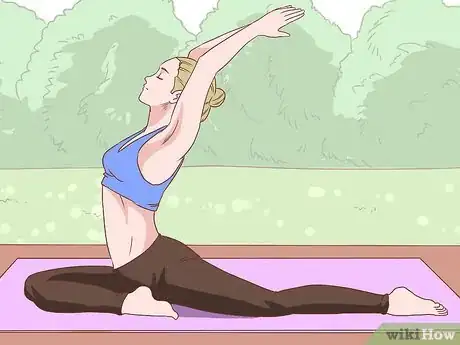


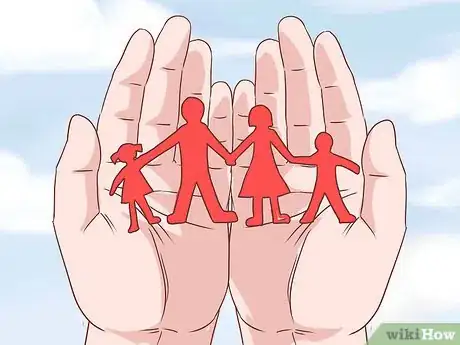



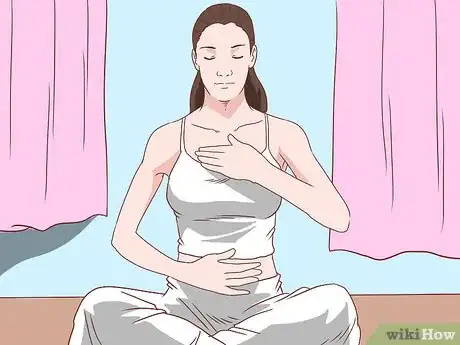

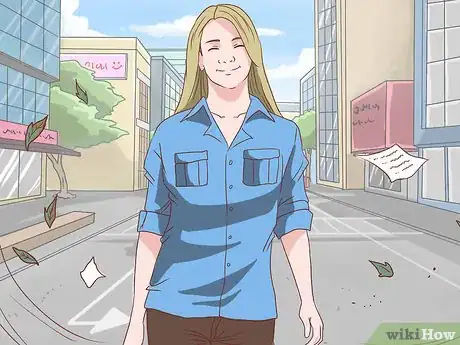
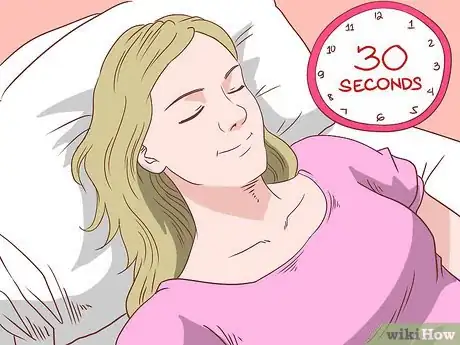





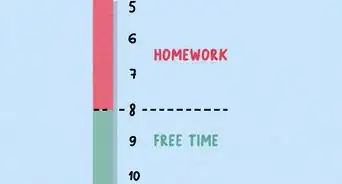






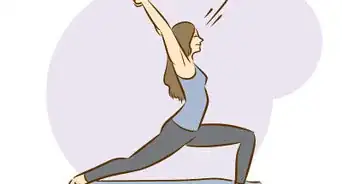

















































Medical Disclaimer
The content of this article is not intended to be a substitute for professional medical advice, examination, diagnosis, or treatment. You should always contact your doctor or other qualified healthcare professional before starting, changing, or stopping any kind of health treatment.
Read More...